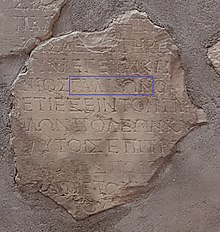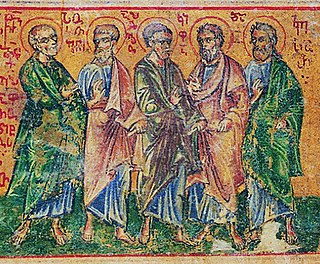
Apollos was a 1st-century Alexandrian Jewish Christian mentioned several times in the New Testament. A contemporary and colleague of Paul the Apostle, he played an important role in the early development of the churches of Ephesus and Corinth.

The First Epistle to the Thessalonians is a Pauline epistle of the New Testament of the Christian Bible. The epistle is attributed to Paul the Apostle, and is addressed to the church in Thessalonica, in modern-day Greece. It is likely among the first of Paul's letters, probably written by the end of AD 52, in the reign of Claudius although some scholars believe the Epistle to the Galatians may have been written by AD 48. The original language is Koine Greek.
Sosthenes was the chief ruler of the synagogue at Corinth, who, according to the Acts of the Apostles, was seized and beaten by the mob in the presence of Gallio, the Roman governor, when Gallio refused to proceed against Paul at the instigation of the Jews. The motives of this assault against Sosthenes are not recorded. Some manuscripts assert the mob was composed of "Greeks"; others read "Jews".
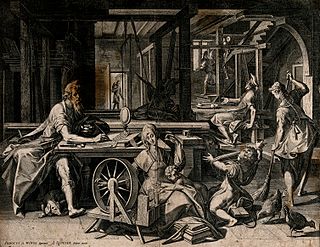
Priscilla and Aquila were a first-century Christian missionary married couple described in the New Testament. Aquila is traditionally listed among the Seventy Disciples. They lived, worked, and traveled with the Apostle Paul, who described them as his "fellow workers in Christ Jesus".
Lucius Junius Gallio Annaeanus or Gallio was a Roman senator and brother of the writer Seneca. He is best known for dismissing an accusation brought against Paul the Apostle in Corinth.

The Delphi Inscription, or Gallio Inscription, is the name given to the collection of nine fragments of a letter written by the Roman emperor Claudius in 52 CE which was discovered early in the 20th century at the Temple of Apollo in Delphi, Greece.
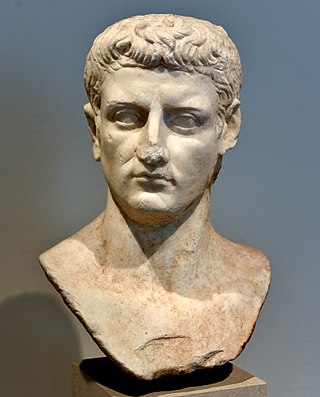
References to an expulsion of Jews from Rome by the Roman emperor Claudius, who was in office AD 41–54, appear in the Acts of the Apostles (18:2), and in the writings of Roman historians Suetonius, Cassius Dio and fifth-century Christian author Paulus Orosius. Scholars generally agree that these references refer to the same incident.
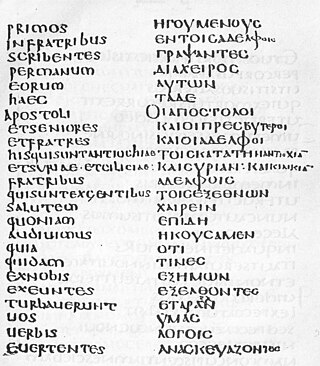
Acts 13 is the thirteenth chapter of the Acts of the Apostles in the New Testament of the Christian Bible. It records the first missionary journey of Paul and Barnabas to Cyprus and Pisidia. The book containing this chapter is anonymous, but early Christian tradition uniformly affirmed that Luke composed this book as well as the Gospel of Luke. From this point onwards, except for the Council held in Jerusalem, Luke's narrative focusses on Paul, his ministry, and the events of his life.

Acts 14 is the fourteenth chapter of the Acts of the Apostles in the New Testament of the Christian Bible. It records the first missionary journey of Paul and Barnabas to Phrygia and Lycaonia. The book containing this chapter is anonymous but early Christian tradition uniformly affirmed that Luke composed this book as well as the Gospel of Luke.

Acts 16 is the sixteenth chapter of the Acts of the Apostles in the New Testament of the Christian Bible. It records the start of the second missionary journey of Paul, together with Silas and Timothy. The book containing this chapter is anonymous, but early Christian tradition uniformly affirmed that Luke composed this book as well as the Gospel of Luke.

Acts 19 is the nineteenth chapter of the Acts of the Apostles in the New Testament of the Christian Bible. It records part of the third missionary journey of Paul, focussing on his time spent in Ephesus. The author of the book containing this chapter is anonymous, but early Christian tradition uniformly affirmed that Luke composed this book as well as the Gospel of Luke.
Acts 20 is the twentieth chapter of the Acts of the Apostles in the Christian New Testament of the Bible. It records the third missionary journey of Paul the Apostle. The narrator and his companions ("we") play an active part in the developments in this chapter. The book containing this chapter is anonymous, but early Christian tradition uniformly affirmed that Luke the Evangelist composed this book as well as the Gospel of Luke.

Acts 21 is the twenty-first chapter of the Acts of the Apostles in the New Testament of the Christian Bible. It records the end of Paul's third missionary journey and his arrival and reception in Jerusalem. The narrator and his companions ("we") play an active part in the developments in this chapter. The book containing this chapter is anonymous, but early Christian tradition uniformly affirmed that Luke composed this book as well as the Gospel of Luke.

Acts 22 is the twenty-second chapter of the Acts of the Apostles in the New Testament of the Christian Bible. It records the events leading to Paul's imprisonment in Jerusalem. The book containing this chapter is anonymous, but early Christian tradition uniformly affirmed that Luke composed this book as well as the Gospel of Luke.

Acts 23 is the twenty-third chapter of the Acts of the Apostles in the New Testament of the Christian Bible. It records the period of Paul's imprisonment in Jerusalem and then in Caesarea. The book containing this chapter is anonymous, but early Christian tradition uniformly affirmed that Luke composed this book as well as the Gospel of Luke.

Acts 24 is the twenty-fourth chapter of the Acts of the Apostles in the New Testament of the Christian Bible. It records the period of Paul's imprisonment in Caesarea. The book containing this chapter is anonymous, but early Christian tradition uniformly affirmed that Luke composed this book as well as the Gospel of Luke.

Romans 12 is the twelfth chapter of the Epistle to the Romans in the New Testament of the Christian Bible. It is authored by Paul the Apostle, while he was in Corinth in the mid-50s AD, with the help of an amanuensis (secretary), Tertius, who adds his own greeting in Romans 16:22. According to Martin Luther,
In chapter 12, St. Paul teaches the true liturgy and makes all Christians priests, so that they may offer, not money or cattle, as priests do in the Law, but their own bodies, by putting their desires to death. Next he describes the outward conduct of Christians whose lives are governed by the Spirit; he tells how they teach, preach, rule, serve, give, suffer, love, live and act toward friend, foe and everyone. These are the works that a Christian does, for, as I have said, faith is not idle.
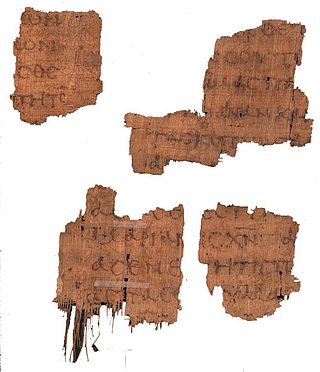
Romans 16 is the sixteenth chapter of the Epistle to the Romans in the New Testament of the Christian Bible. It was authored by Paul the Apostle, while Paul was in Corinth in the mid-50s AD, with the help of a secretary (amanuensis), Tertius, who adds his own greeting in verse 22. While this chapter contains Paul's personal recommendation, personal greetings, final admonition, grace, greetings from companions, identification of its writer/amanuensis and a blessing, Martin Luther notes that it
also includes a salutary warning against human doctrines which are preached alongside the Gospel and which do a great deal of harm. It's as though he had clearly seen that out of Rome and through the Romans would come the deceitful, harmful Canons and Decretals along with the entire brood and swarm of human laws and commands that is now drowning the whole world and has blotted out this letter and the whole of the Scriptures, along with the Spirit and faith. Nothing remains but the idol Belly, and St. Paul depicts those people here as its servants. God deliver us from them. Amen.
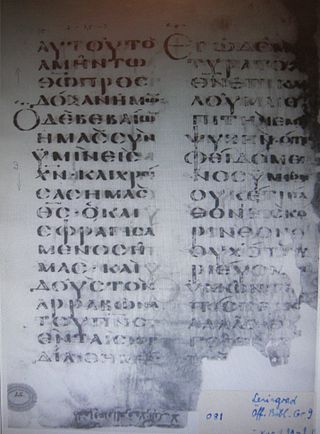
2 Corinthians 1 is the first chapter of the Second Epistle to the Corinthians in the New Testament of the Christian Bible. It is authored by Paul the Apostle and Timothy in Macedonia in 55–56 CE.

Titus 3 is the third and final chapter of the Epistle to Titus in the New Testament of the Christian Bible. The letter is traditionally attributed to Paul the Apostle, sent from Nicopolis of Macedonia, addressed to Titus in Crete. Some scholars argue that it is the work of an anonymous follower, written after Paul's death in the first century AD. This chapter contains the author's instruction for the church as a community with responsibilities in the public realm, towards the government and also towards individuals, concluded with some personal requests for Titus before the final benediction.


